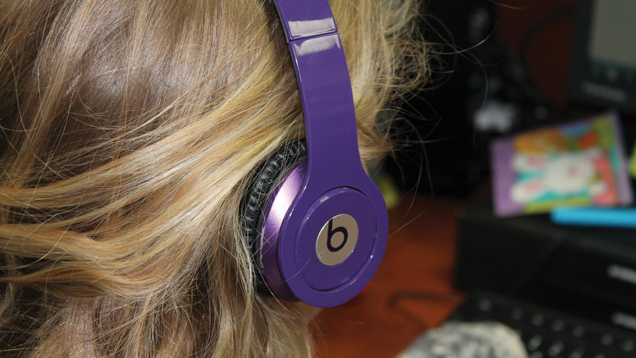Tinnitus, a common hearing problem among youth, precedes hearing loss
 CREDIT: KERRA SEAY
CREDIT: KERRA SEAYNoise-cancelling headphones, such as these, are recommended to protect your ears from tinnitus and other damage.
The 2012 and 2013 Statistics Canada survey revealed that 41 per cent of Canadians aged three to 79 have experienced tinnitus while it was also estimated that 51 per cent of Canadians in the same age bracket uses earphones to listen to audio sounds.
Tinnitus is not a disease, but is a symptom of health issues usually associated with hearing. This could be due to ear trauma or an infection, cardiovascular disorders, genetic or aging-induced hearing loss, dental problems or side effects of some drugs. However, damage from loud noise is often the cause of tinnitus and hearing loss.
Aaron Austin, a first year student in general arts said that he does not experience tinnitus. He also stated that he does not use the earpiece all the time, and only uses them for receiving calls and listening to music.
However, Ruby Rabah and Kayla Williams, both first year students of Police Foundation, said that they use their earphones in the gym, on the bus or any time they can. Rabah especially expressed concern that she still hears the ringing of her lost phone.
Describing tinnitus as a perception of sound or literally ringing (buzzing or hissing) in the ear in the absence of an external cause of the sound, Gail McHardy-Leitch, audiologist at Connect Hearing in London, said it is important to understand how hearing works to understand tinnitus.
“Sound makes the eardrum vibrate sufficiently to move the three little bones in the ear, which in turn cause a wave in the cochlear fluid. The wave pushes the hair cells up against the tectorial membrane and causes them to bend, thus sending a message to the brain through the attached nerves,” she said.
McHardy-Leitch also explained that each little hair cell in the cochlea codes for a musical tone, just like a piano, and bends in response to corresponding sounds that travel through the ear canal. Talking, slamming the door or whispering therefore stimulates a different pattern of hair cells.
“Noise or loud sounds push the hair cells too high against the top membrane and causes them to be broken, bent or damaged. Over time, the attached nerves atrophy due to loss of stimulation from the damaged hair cells, and the whole pathway up to the brain degenerates.”
McHardy-Leitch compared the sound we hear during tinnitus to phantom limb syndrome. Permanently bent hair cells continuously stimulate the attached nerves to send signal to the brain when there is no sound causing them.
To prevent tinnitus, McHardy- Leitch advised that exposure to loud noise over time should be avoided. She stressed that apart from tinnitus, high-pitched sounds such as F, S, T, TH, P and K, which are important for speech, are gradually lost as loud noise damages the cochlea.
“Resting the ear for about 48 hours helps it recover from a temporary noise damage. Using equipment that is quieter and wearing ear protection in persistently noisy environments, such as in concerts or at work, is therefore essential,” she advised.
While expressing concern for road safety, McHardy-Leitch also advised that noise cancelling headphones that seal the whole outer ear are preferable to the smaller earphones. She further stressed that it is better not to listen to music in a noisy environment because we tend to turn it up louder to drown the external sounds.
“If you can hear the music from another person’s earpiece, then it is too loud. Tinnitus is a warning signal to protect the ears more from damaging noise.”














